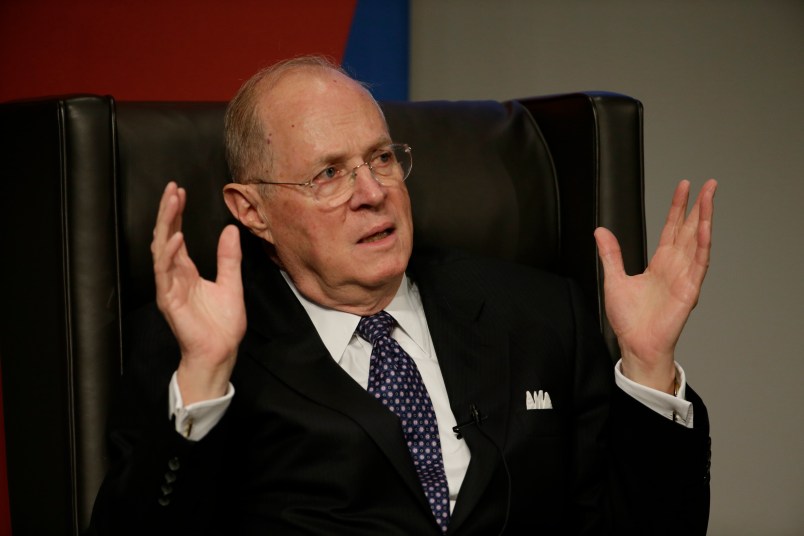Of the many pro-Obamacare arguments that government lawyers are making to save the law from the Supreme Court, one stands out as particularly tailored to winning the crucial vote of Justice Anthony Kennedy.
The argument is about federalism, long a guiding light for the Reagan-appointed jurist whose vote both sides are working to win in King v. Burwell, a case before the Court that threatens to blow a hole in Obamacare.
“There’s no question that Justice Kennedy regards federalism as a central value in the Constitution,” Michael C. Dorf, a law professor at Cornell University and former clerk for the justice, told TPM in an email. “Accordingly, he typically votes to sustain challenges to very expansive views of federal power.”
Specifically, the law’s defenders say it would violate states’ rights for Obamacare to deny subsidies for residents of some three-dozen states without a clear warning. Nowhere in the law were states told that eligibility for premium tax credits would hinge on them setting up state-run exchanges, as opposed to letting the federal government handle it.
The states’ rights argument — unusual in this instance because it is typically used against the federal government, not in defense of it — was made in a brief filed by 23 attorneys general in states ranging from California and New York to North Dakota and North Carolina.
The AGs wrote that the challengers’ view would “violate basic principles of cooperative federalism by surprising the States with a dramatic hidden consequence of their Exchange election.” They continued, “Every State engaged in extensive deliberations to select the Exchange best suited to its needs. None had reason to believe that choosing a federally-facilitated Exchange would alter so fundamental a feature of the ACA as the availability of tax credits. Nothing in the ACA provided clear notice of that risk, and retroactively imposing such a new condition now would upend the bargain the States thought they had struck.”
The Obama administration’s brief makes a similar point, arguing that overturning the IRS rule on subsidies would disrespect “State sovereignty.”
“It would be astonishing if Congress had buried a critically important statewide bar to the subsidies under this landmark legislation in subclauses setting forth the technical formula for calculating how much the subsidy should be,” the brief, led by Solicitor General Donald Verrilli, said. “The Act should be interpreted to avoid the disrespect for State sovereignty inherent in petitioners’ reading.”

President Barack Obama speaks at a press conference in the East Room of the White House February 9 , 2015 in Washington, DC.
The conservative challengers know what the Obama administration and its allies are up to, but they say the strategy won’t work.
“These arguments are likely aimed at Kennedy (and, to a lesser degree, [Chief Justice John] Roberts), but they involve significant risks to the government,” Jonathan Adler, an architect of the legal challenge in King, said in an email. “In my view, states were on notice because the text of the statute is clear. Insofar as states were caught off guard it is because of what they were being told by the federal government, including by the IRS in its regulation.”
The challengers allude to states’ rights as well in their brief, but their task is harder because a victory for their side would likely be damaging to many states. They argue, “Under the Constitution’s core federalism constraints … Congress cannot compel sovereign states to create Exchanges.” They contend that the law’s authors used “carrots” and “sticks” to entice states to set up exchanges, but many refused, as is their right.
In a separate brief, Oklahoma sides with the conservative opponents of Obamacare and says its argument against the tax subsidies is consistent with states’ rights.
“Congress’s conditioning of the tax credits came as no surprise to the States,” wrote Oklahoma’s attorney general and solicitor general. “First … such incentivizing is the norm in cooperative federalism programs. Second, the plain text of Section 36B plainly described the incentive, and other sections of the Act plainly describe the consequences of declining to accept the incentive.”
Three former Kennedy clerks — Dorf, Orin Kerr, and Chris Walker — told TPM they weren’t sure if the federalism arguments would determine the justice’s decision in the case.
Kennedy voted to wipe out Obamacare entirely in 2012, when the Supreme Court heard a constitutional argument against the individual mandate to buy insurance. The new case involves a narrower question of how the language of the law should be read with regard to subsidy eligibility. Oral arguments are set for March 4, and a decision is expected by the end of June.
With the stakes so high, Obamacare legal defenders believe it’s worth appealing to Kennedy, and at least some experts believe it will pay off.
“The clear notice objection presented by state officials is the argument most likely to persuade Kennedy and the Court to uphold the IRS interpretation,” Frank Colucci, a professor who wrote a book analyzing Kennedy’s jurisprudence, told The Washington Post’s Greg Sargent. “When the federal government places conditions on funding and programs it offers to states, the Court requires the conditions be expressed unambiguously.”







Does anyone believe that each of these “Justices” are going into this with an open mind? That they will actually listen to, and consider the arguments they hear? Really?
We.will.see. Hard to believe they will strike down the law (in effect) given the practical consequences, but…
So the haters’ argument is “States should have read the law with the potential specious arguments of teatroll litigants in mind rather than the clear intent of Congress,” basically. And it’s even odds at best whether Federalism Man nukes our system of healthcare provision just to watch the pretty flames. Patriot-tastical.
Not me.
I just noticed your name. Are you in central VA, cville proper?